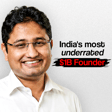
Shreya/Sonu/Arijit or Youtube/Spotify - Who Really Makes Money From Bollywood Songs?
"80 to 90% of income for all artists, even Arijit Singh and Shreya Ghoshal, comes from live events only. YouTube pays barely 1-2 paise per stream today."
This shocking revelation from Gaurav Dagaonkar exposes the broken economics of the music industry. While millions stream their favorite songs, artists make almost nothing from digital plays - a problem that led him to build Hoopr, India's leading music licensing platform.
Gaurav Dagaonkar is the Co-founder and CEO of Hoopr, India's leading music licensing platform serving over 200,000 creators and 125+ enterprise clients including Myntra, ITC, and Marico. An IIM Ahmedabad MBA who rejected corporate placements to pursue music, Gaurav spent over a decade as a successful Bollywood music director working on films like Joker, Heartless, and Lanka. His YouTube channel Songfest has garnered half a million followers. After experiencing the industry's broken economics firsthand, he built Hoopr, which has raised multiple funding rounds and revolutionized how creators access licensed music. Host Akshay Datt explores how domain expertise combined with business acumen created this remarkable entrepreneurial success story.
Key Insights from the Conversation:
👉Industry Economics: Music streaming pays artists only 1-3 paise per play, forcing 80-90% of artist income to come from live performances
👉Market Opportunity: Only 1-2% of venues comply with music licensing laws, representing a massive untapped market
👉Customer Validation: Hoopr interviewed 150+ creators and 50+ brands before building their platform, ensuring strong product-market fit
👉Revenue Model Innovation: Rejecting minimum guarantee models in favor of transparent unit economics created sustainable growth
👉Creator Impact: Independent artists can earn more from a single micro-sync license than years of streaming revenue
👉Copyright Complexity: Indian artists gave away both publishing and master rights, unlike Western markets where artists retained publishing control
#entrepreneurship #startup #musicindustry #creatoreconomy #iimahmedabad #bollywood #musictech #foundingindia #musiclicensing #startupjourney #businessbuilding #artistrights #copyrightlaw #digitalcreators #musicbusiness #startupfunding #productmarketfit #indianstartups #creativeindustry #founderstory #musicentrepreneur #techinnovation #platformbusiness #revenuemodel #sustainablebusiness #startuplife #entrepreneurmindset
Disclaimer: The views expressed are those of the speaker, not necessarily the channel



















